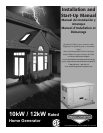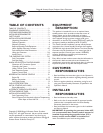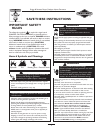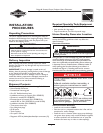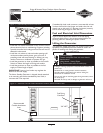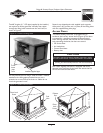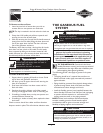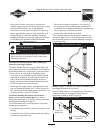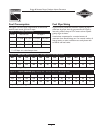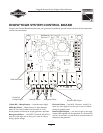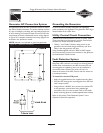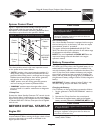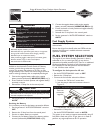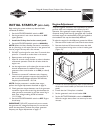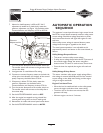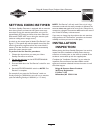
4
Briggs & Stratton Power Products Home Generator
Installation Manual
INSTALLATION
PROCEDURES
Unpacking Precautions
The unit is shipped bolted to its mounting pad, ready for
installation.Avoid damage from dropping, bumping, collision,
etc. Store and unpack carton with the proper side up, as
noted on the shipping carton.
Delivery Inspection
After removing the carton, carefully inspect the Home
Standby Generator for any damage that may have occurred
during shipment.
IMPORTANT: If loss or damage is noted at time of
delivery, have the person(s) making delivery note all damage
on the freight bill and affix his signature under the
consignor's memo of loss or damage. If loss or damage is
noted after delivery, separate the damaged materials and
contact the carrier for claim procedures. Missing or
damaged parts are not warranted.
Shipment Contents
The Home Standby Generator is supplied with:
• Home Standby Generator
• Pre-attached mounting pad
• One 24” flexible hook-up hose
• Installation and start-up manual (P/N 192385GS)
• Operator’s manual(P/N 192384GS)
• Illustrated parts list manual (P/N 193208GS for
model 01815 or P/N 193918GS for model 01938)
• Installation checklist (P/N 190840GS)
• Three access door keys
• Four lifting hole plugs
• Oil fill spout
• Touch-up paint
• One spare 15A fuse
• Diagnostic LED kit (diode/plate/decal/pin connectors (2))
Required Specialty Tools/Equipment
• Two 48” lengths of 1” OD pipe (NOT conduit)
• Hole punches for 16ga steel
• Torque screwdriver, 5 to 50 inch-pound range
Home Standby Generator Location
Before installing generator, consult with homeowner and
convey the following guidelines which may affect the
desired location.
Generator Clearances
Place generator in a well ventilated area, which will allow for
removal of deadly exhaust gas. DO NOT install generator
where exhaust gas could accumulate and enter inside or be
drawn into a potentially occupied building. Ensure exhaust gas
is kept away from any windows, doors, ventilation intakes or
other openings that can allow exhaust gas to collect in a
confined area (Figure 1). Prevailing winds and air currents
should be taken into consideration when positioning generator.
General Location Guidelines
• Install the unit outdoors ONLY.
• Place the unit in a prepared location that is flat and has
provisions for water drainage.
• Install the unit in a location where sump pump discharge,
rain gutter down spouts, roof run-off, landscape irrigation,
or water sprinklers will not flood the unit or spray the
enclosure and enter any air inlet or outlet openings.
• Observe that the 15 Amp fuse has been removed from the
control panel for shipping.
• DO NOT install this fuse until all plumbing and wiring has
been completed and inspected.
Installing the 15A fuse could cause the engine to start.
CAUTION
• Keep at least 5 ft. (152 cm) clearance on all sides of generator
including overhead.
Exhaust heat/gases can ignite combustibles or
structures causing a fire.
WARNING
Using a generator indoors WILL KILL YOU
IN MINUTES.
Exhaust contains carbon monoxide, a
poison gas you cannot see or smell.
NEVER use in the home
or in partly enclosed
areas such as garages.
ONLY use outdoors and
far from open windows,
doors, and vents.



